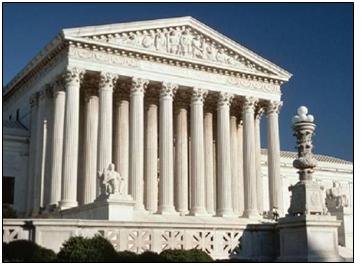By Isaac MacMillen

By allowing Guantanamo Bay detainees to sue the federal government for habeas corpus, the Supreme Court has effectively swamped the D.C. District Court—the court that deals with the greatest number of judicial review cases. In fact, the detainees’ petitions will submerge the court to such an extent that the Chief Judge, Royce Lamberth, has given up hope of trying any other cases all throughout spring and into the summer.
To understand why it presents such a direct threat to individual freedom from the Obama Administration, a bit of background is in order.
In the United States, jurisdiction to sue the federal government for a crime resides in two places—the location where the offense took place, or the D.C. District Court. Indeed, lack of jurisdiction can cause cases to be dismissed. And the D.C. District Court ends up with the lion’s share of the litigation.
Therefore, it should come as little surprise that over 200 habeas corpus petitions filed with the D.C. District Court are tying the court’s hands from handling the myriads of cases brought against federal statutes and regulations.
This relocation of the habeas corpus cases to the district court is prompted in part by the controversial 5-4 Supreme Court decision last year (Boumediene v. Bush) that did away with military tribunals and gave detainees the right to sue the federal government challenging their detention. Leading the dissent, Chief Justice John Roberts wondered if the ruling was actually about the Court desiring “control of federal policy regarding enemy combatants.”
The irony in the decision is that, while attempting to exercise that control, the Supreme Court inadvertently threw a monkey wrench into the entire judicial review process. From the strictest constitutional ‘big picture’ perspective, clogging up the courts eliminates much of the “check” with which the judiciary is supposed to “balance” out both the executive and legislative branches.
Practically, and more immediately, however, the ruling has given the Obama Administration a window during which they can pass legislation without much fear of constitutional challenge for the foreseeable future. And for American taxpayers, this represents a “clear and present danger” for their hard-earned tax dollars.
Over the past two years, the Treasury, the Fed, FDIC, and Congress have already promised “$1 trillion in stimulus packages, around $3 trillion in lending and spending and $5.7 trillion in agreements to provide aid,” according to Bloomberg. Grand total: $9.7 trillion. This is largely unconstitutional, the article points out, as less than $900 billion has even been voted upon by Congress; the remaining $8 trillion has been distributed by the FDIC and Fed. And the executive branch has been showing a reluctance to disclose exactly who received the funds.
But even that monstrous sum, which will certainly be added to in the coming months, does not include all the massive programs that the nation’s new President is pushing—such as his cap-and-trade program, now estimated to cost upwards of $2 trillion. This is money most economists agree the nation cannot afford to be spending on additional energy costs during a deepening recession.
Unfortunately, the judicial review loophole will allow the president to pass numerous pieces of radical legislation while complicating any legal challenges. In essence, the Supreme Court’s decision is the equivalent of removing security cameras from a bank—it only serves as an invitation for bank robbers. And after seeing the appetite for taxpayer dollars displayed so far by the Obama administration and the Democratic Congress, such a tempting opportunity would likely not go unused.
The Supreme Court likely did not see this ‘secondhand effect’ as it ruled on behalf of the detainees. Yet the lesson they are learning, if forgotten by the President and his fellow legislators, will come back to haunt them in the future, as the separation of powers is wrecked. And American taxpayers will find themselves deprived not only of their hard-earned money, but of their hard-won freedom, as well.
Isaac MacMillen is a Contributing Editor of ALG News Bureau.

